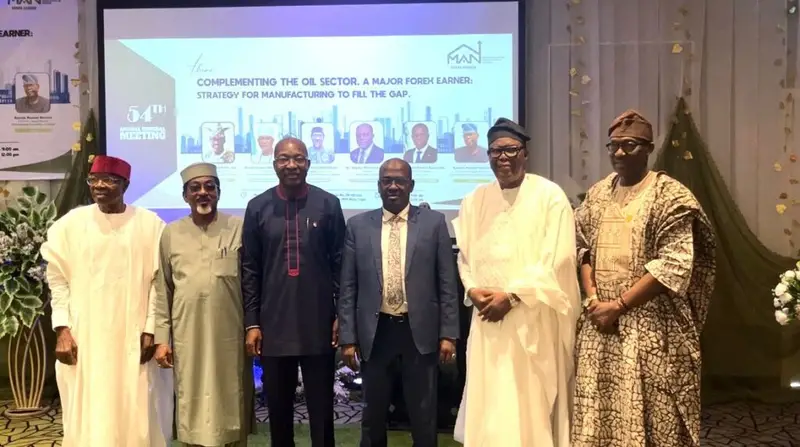News Investigators/ Governor of the Central Bank of Nigeria (CBN), Olayemi Cardoso, has urged manufacturers to lead efforts in diversifying Nigeria’s foreign exchange earnings from crude oil dependence.
Mr Cardoso made the call at the 54th Annual General Meeting (AGM) of the Manufacturers Association of Nigeria (MAN), Apapa Branch.
The event had the theme: ‘Complementing the Oil Sector, a Major Forex Earner: Strategy for Manufacturing to Fill the Gap.’
Mr Cardoso was represented by Mr Aliyu Ashiru, Director, Trade and Exchange Department.
He said Nigeria’s economy had long been dominated by crude oil exports, which accounted for more than 80 per cent of foreign exchange inflows.
This dependence, he noted, made the economy highly vulnerable to external shocks.
He stressed that manufacturing held significant potential to conserve forex, expand exports with value-added products, create jobs at all levels, and enhance macroeconomic stability.
The apex bank governor said a deliberate, coordinated, long-term strategy was required to unlock the sector’s full potential and transform it into a major forex earner.
He listed strategic pillars for growth, including policy alignment, investment in infrastructure and energy, access to finance and forex, value addition, and backward integration.
He emphasised the need for a comprehensive industrial policy prioritising export-oriented manufacturing.
“This policy must be stable, predictable and aligned with trade, monetary and fiscal frameworks.
“Incentives such as tax holidays, duty waivers for machinery, export rebates and investment guarantees should target manufacturers producing for export markets.
“Nigeria must move from exporting raw materials to value-added products.
“This requires deliberate investment in backward integration, especially in agro-processing, petrochemicals and solid minerals,” he said.
Mr Cardoso assured that the CBN would continue supporting the sector through proactive monetary policies and targeted financing interventions.
In his remarks, President of MAN, Otunba Francis Meshioye, said global oil price volatility underscored the urgency of diversifying Nigeria’s foreign exchange sources.
He identified priority areas including better infrastructure, lower production costs, affordable finance and the promotion of high-export-potential products.
Mr Meshioye also urged government intervention in industrial clusters, particularly within Amuwo-Odofin and Apapa areas of Lagos State.
“We urge government to address road networks in Amuwo-Odofin and Kirikiri industrial layouts, where many companies operate.
“Firms are willing to support rehabilitation in exchange for tax breaks.
“Improved industrial roads will reduce vehicle wear, enhance logistics and boost competitiveness,” he said.
Mr Meshioye further called for harmonisation of taxes and levies, particularly at local government level, to reduce exploitation and improve compliance for manufacturers.
Lagos State Governor, Babajide Sanwo-Olu, reaffirmed support for the sector, describing it as a formidable pillar for inclusive economic growth.
He was represented by Mrs Folashade Ambrose-Medebem, Commissioner for Commerce, Cooperatives, Trade and Investment.
Mr Sanwo-Olu said his administration prioritised creating an enabling environment where industries could thrive, expand and compete globally.
“The disruptions and forex crisis experienced over the years highlight the importance of reducing import dependence.
“Lagos is championing agro-industrial linkages, connecting farmers to processors and strengthening local supply chains.
“In this digital age, competitiveness is inseparable from innovation.
“Lagos is building an innovation-driven economy where smart manufacturing supports productivity and efficiency,” he said.
Chairman of MAN Apapa Branch, Raphael Danilola, appealed to government to address operational challenges affecting manufacturers nationwide.
He identified challenges including poor road networks in industrial clusters, inadequate power, rising logistics costs, insecurity, and forex volatility.
Mr Danilola said tackling these problems was essential to improve competitiveness and boost manufacturing’s contribution to forex earnings.
NAN
